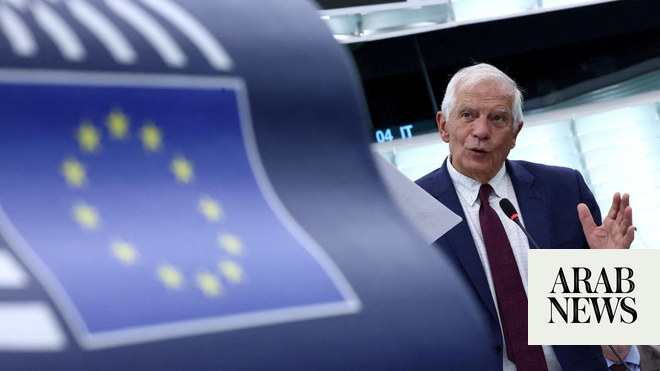
European countries are diverging on how and when to reopen their shuttered societies, as Germany, the Czech Republic, Norway and others prepared to lift some restrictions on Monday while France and Spain ruled out any relaxation for several weeks.
The confirmed coronavirus death toll in Europe approached 100,000 on Sunday, according to the Johns Hopkins University tally, but infection rates continued to slow, heaping pressure on governments to start easing the economic and social burden of a weeks-long shutdown.
Germany will permit small retail spaces to reopen from Monday alongside car dealerships, cycling stores and bookshops, though people will be urgently advised to wear masks while in public.
Poland will reopen parks and forests from Monday, while children in Norway will return to kindergarten and open-air markets in the Czech Republic will be permitted to trade as part of a six-week strategy to gradually lift restrictions.
In Spain, with nearly 200,000 confirmed cases and more than 20,000 deaths, authorities said at the weekend they would hold off on lifting one of Europe’s tightest lockdowns.
“We have done the most difficult things and we have left the most extreme moments of the crisis behind with sacrifice and resilience, but these results are still not enough and still fragile,” said the prime minister, Pedro Sanchez, in a televised address on Saturday evening.
“Despite the enormous progress that we have made, it is not possible for us to lift the confinement and move to a phase of scaling down [the restrictions].”
He said the restrictions would be loosened slightly to allow children time outside from 27 April. Spain’s Covid-19 death toll rose by 410 on Sunday, the lowest daily increase since 22 March.
French officials said on Sunday that although the virus appeared to be under control there, the country’s strict lockdown would continue for at least another three weeks.
“It is an epidemic unique in France in modern history and it is not finished,” said the prime minister, Édouard Philippe. “We are making progress against this epidemic. The situation is improving slowly but surely … but we are not out of the health crisis. To think the epidemic is behind us would be an error.”
He added: “Our lives after 11 May will not be exactly the same as before the lockdown. Not at once and probably not for a long time.” More than 150,000 French people have tested positive for the virus and nearly 20,000 have died.
Philippe said isolating positive cases, some degree of social distancing, an emphasis on washing hands, as well as “massive and quick testing” of those showing symptoms of the virus and their contacts was likely to persist even if restrictions were eased in May.
“We have to learn to live with the virus,” he said. “We see the population is not immunised – it may be one day, but today it is not, the circulation of the virus has been restrained. Nor will we have a vaccine before 2021 … and at this stage there is no treatment that has been shown to work. That leaves us one instrument: prevention.”
President Emmanuel Macron announced last week that schools would begin to open from 11 May, but Philippe said on Sunday they would do so gradually. He said the government was considering various options, including having half a class in rotation, or opening schools in areas where there have been few or no Covid-19 cases before others.
After a week of slowing infection rates in Israel, the government there announced on Sunday it was easing the stringent quarantine measures in place for the past five weeks. It will allow the partial reopening of hardware, electronic and office supply stores, and group prayer outdoors – for up to 19 people, standing two metres apart – and extend the perimeter for exercise to 500 metres from a person’s home.
Preschools, schools, hairdressers and shopping malls will remain closed, and people will continue having to wear a mask in public spaces, with fines for non-compliance.
The country of 9 million has had 158 casualties and about 13,000 cases. The relaxed measures will be trialled for a fortnight and tougher restrictions reinstated if the infection rate grows again.
Maharashtra, India’s worst-hit state with more than 3,600 confirmed cases among its population of 114 million, said some activity would be permitted in its least-affected areas while maintaining a strict lockdown in zones that have the most infections.
South Korea reported only eight new coronavirus cases on Sunday and said it would loosen some of its lockdown restrictions.
The prime minister, Chung Sye-kyun, said the government would consider opening public outdoor facilities and would relax guidelines on the circumstances in which sports facilities and restaurants can open. Other measures that were due to expire on Sunday were extended until 5 May.
South Korea has recorded 10,661 infections and 234 deaths. “We must not let down our guard until the last confirmed patient is recovered,” the president, Moon Jae-in, said on Sunday.
The UK, which is still in the middle of its outbreak, has said it is too soon to give dates on easing its lockdown.
Pushbacks against lockdown measures continue elsewhere, including in Brazil. In Rio de Janeiro, São Paulo and the capital, Brasilia, people took to the streets calling for the resignation of politicians who had decided to implement strict controls.
The president, Jair Bolsonaro, has been fiercely critical of the measures and on Thursday he fired his health minister, Luiz Henrique Mandetta, who had defended physical distancing.
Agencies contributed to this report












